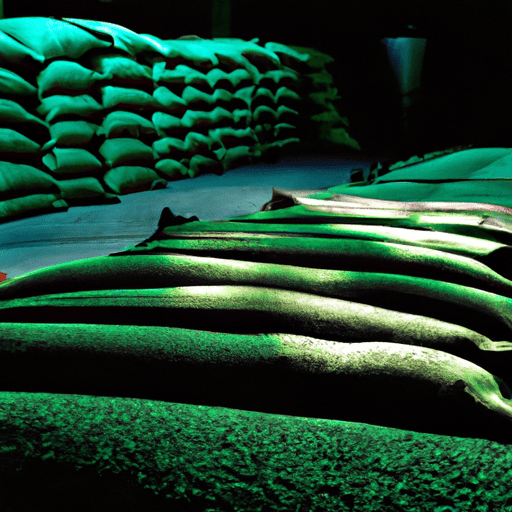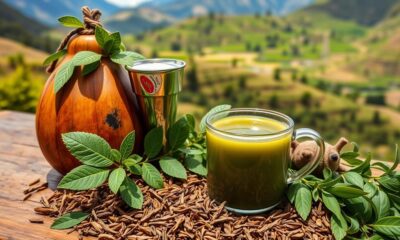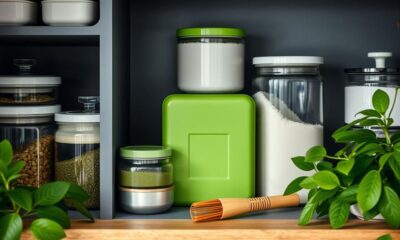Coffee Roasting
How Do Large Coffee Roasting Places Store Their Green Beans

As a coffee lover, the aroma of freshly roasted coffee beans is like a warm embrace. But have you ever wondered how those beans are stored before they reach your cup? The answer lies in the importance of proper green bean storage.
Green coffee beans, like any other agricultural product, need to be stored correctly to maintain their quality and freshness. It’s a delicate balance of temperature control, humidity levels, packaging, inventory management, and quality control.
I can tell you the nitty-gritty details of how large coffee roasting places store their green beans to ensure that you get that perfect cup of coffee every time.
Key Takeaways
- Large coffee roasting places use airtight containers and temperature-controlled transport to store green beans.
- Different varieties of green beans require different storage conditions, with ideal temperature ranging between 55°F and 70°F and optimal humidity range between 60%-70%.
- Moisture prevention techniques are important, and exposure to light and air can lead to spoilage and decreased quality.
- Sustainable packaging and durability are important, with specialized shipping containers controlling temperature and humidity and storage facility design considering temperature, humidity, ventilation, and lighting.
The Importance of Proper Green Bean Storage
Don’t let your precious green beans go to waste – it’s crucial to store them properly! As a coffee roaster, I know how important it is to keep green beans fresh and preserve their quality.
The first step is to ensure that the beans are sourced from reputable suppliers who’ve taken proper care during transportation. This means that the beans aren’t exposed to excessive moisture or heat that can compromise their flavor and aroma.
Once the beans are in your possession, it’s important to store them properly to maintain their freshness. Proper storage begins with keeping the beans in a cool, dry place away from direct sunlight. This helps to prevent the beans from becoming stale or developing off-flavors.
Additionally, it’s important to consider the roasting methods that’ll be used, as different varieties of beans require different storage conditions.
With proper green bean sourcing and storage, the next step is to focus on temperature control…
Temperature Control
Maintaining precise temperature is crucial for preserving the quality of freshly harvested coffee beans in storage. Large coffee roasting places rely on refrigeration options to keep their green beans fresh and flavorful. The ideal storage temperature for green coffee beans is between 55°F and 70°F, as exposure to higher temperatures can lead to the loss of flavor and aroma.
In addition to refrigeration, moisture prevention techniques are equally important in storing green coffee beans. Moisture can cause the beans to lose their quality and can even lead to mold growth. Large coffee roasters use a variety of methods to prevent moisture from affecting their beans, such as using desiccants, sealing the bags tightly, and storing the beans in low humidity environments. By controlling both temperature and moisture, large coffee roasters are able to ensure the highest quality of beans for their customers.
Transitioning into the next section on humidity levels, it’s important to note that controlling humidity is just as important as temperature and moisture control. Even with the best temperature and moisture control, high humidity can still adversely affect the beans.
Humidity Levels
You’ll want to make sure that the humidity levels are just right to preserve the quality of your freshly harvested coffee beans. Controlling moisture is crucial to prevent spoilage, mold growth, and the loss of aroma and flavor. Too much moisture in the air can cause bean deterioration, while too little can lead to dehydration and brittleness.
The optimal humidity range for storing green coffee beans is between 60% and 70%. A humidity level higher than 70% can cause mold growth and off-flavors, while a level lower than 60% can cause the beans to lose flavor and become too dry. To maintain the ideal humidity level, coffee roasters use dehumidifiers, air conditioning, and ventilation systems.
By controlling the humidity, coffee roasters can ensure that their green beans stay fresh and flavorful until they’re ready to be roasted. When it comes to packaging, it’s important to keep in mind that the container should be airtight and moisture-proof.
In the next section, we’ll discuss the different types of packaging materials that are commonly used in the coffee industry.
Packaging
When it comes to packaging, I know firsthand the importance of choosing the right materials for storing coffee beans. It’s essential to avoid exposure to light and air, which can quickly degrade the quality of the coffee.
That’s why coffee roasters need to carefully consider the type of packaging they use to ensure their beans stay fresh and flavorful for as long as possible.
Choosing the Right Packaging Materials
If you’re looking to choose the right packaging materials for your green beans, it’s important to consider factors like freshness, durability, and sustainability. Sustainable packaging is not only environmentally friendly, but it can also be cost effective in the long run. Materials like biodegradable plastics, compostable packaging, and recycled materials can all be viable options for storing your green beans.
In addition to sustainability, durability is also a crucial factor in choosing packaging materials. Look for materials that will protect your beans from damage during transportation and storage. This can include sturdy bags with strong seals or even vacuum-sealed packaging. By choosing the right packaging materials, you can ensure that your green beans remain fresh and intact for as long as possible, avoiding exposure to light and air.
Avoiding Exposure to Light and Air
To keep your green beans fresh, it’s important to keep them away from light and air, like how a vampire avoids sunlight to protect their skin. Exposure to light and air can lead to spoilage and a decrease in the quality of the coffee beans.
Large coffee roasting places typically store their green beans in airtight containers, such as bags or bins, to minimize the amount of air that comes into contact with the beans. These containers are also opaque, which prevents any light from reaching the beans.
In addition to using airtight and opaque containers, large coffee roasting places also take measures to ensure that their green beans are not exposed to air or light during the transportation process. The beans are typically transported in temperature-controlled environments to prevent spoilage and minimize waste.
By taking these steps to prevent spoilage and minimize waste, large coffee roasting places are able to maintain the quality of their green beans and produce high-quality coffee for their customers.
Moving onto inventory management, it’s important for coffee roasting places to have an efficient system in place to keep track of their green beans and ensure that they have enough inventory to meet demand.
Inventory Management
You’ll want to know how large coffee roasting places manage their inventory of green beans. Inventory management is crucial to ensure they have enough beans to meet demand while minimizing waste. Here are some ways they do it:
- Forecasting demand: Large coffee roasting places use historical data, current trends, and future projections to estimate how much coffee they’ll need. This helps them order the right amount of green beans and avoid running out of stock.
- Automated tracking: Many coffee roasting places use software to track their inventory of green beans. This allows them to monitor stock levels, track orders, and schedule deliveries. It also helps them identify trends and adjust their ordering to match demand.
- Regular audits: To ensure they’re not overstocked or understocked, coffee roasting places conduct regular audits of their inventory. This helps them identify any discrepancies and adjust their ordering accordingly.
- Strategic partnerships: Coffee roasting places often partner with suppliers to ensure they have a steady supply of high-quality green beans. This helps them avoid stockouts and ensures they have access to the best beans.
Managing inventory is just one aspect of running a successful coffee roasting business. Quality control is another critical component, which we’ll explore in the next section.
Quality Control
As a coffee roaster, quality control is an essential aspect of our operation. We ensure the quality of our beans by carefully selecting and rejecting defective ones. Sampling and cupping are crucial steps that we take to maintain the consistency and quality of our coffee products.
By doing this, we can ensure that our beans meet our high standards. This process allows us to produce exceptional coffee that our customers can enjoy every time.
Sampling and Cupping
Don’t miss out on the exciting process of sampling and cupping, where I carefully evaluate the flavor profiles of our green beans. This step is crucial in ensuring that we roast and brew high-quality coffee.
During sampling and cupping, I follow these steps:
- Smell the dry beans to identify any off-odors or defects.
- Brew the coffee using the standard brewing ratio.
- Taste the coffee and take notes on the flavor profile, acidity, body, and aftertaste.
Based on the results of the cupping, I can then determine the optimal roasting techniques for each batch of green beans. For example, if the beans have a bright acidity and fruity notes, I may choose a lighter roast to highlight those flavors. If the beans have a more chocolatey or nutty profile, I may opt for a darker roast.
Rejecting defective beans is the next step in the process. By identifying and removing any beans that do not meet our quality standards, we can ensure that only the best beans make it into our roasting and brewing processes.
Rejecting Defective Beans
When inspecting the beans for defects, it’s like searching for a needle in a haystack, but it’s necessary to guarantee the quality of the final product.
Bean grading is an essential step in the process of rejecting defective beans. The grading process involves sorting the beans based on their size, shape, and color, among other factors. Beans that do not meet the quality standards are rejected, and only the ones that meet the required standards are sent for roasting.
Quality standards are of utmost importance when it comes to coffee roasting. Any defects in the beans can lead to a poor quality final product. Therefore, the rejection of defective beans is crucial to ensure that only the best quality beans are used for roasting.
Once the beans are graded and sorted, they are ready for transportation to the roasting facility.
Transportation
Large coffee roasting places typically transport their green beans in large shipping containers, ensuring safe and efficient transportation to their roasting facilities. Logistics management and supply chain optimization are crucial in this process to ensure that the beans arrive in top condition. The transportation process involves several steps, including sourcing the beans from various locations, selecting the appropriate shipping method, and tracking the shipment’s progress.
To ensure that the green beans remain fresh during transportation, roasters use specialized shipping containers that are designed to control temperature and humidity. These containers are equipped with sensors that monitor the environment and adjust the conditions as needed. Additionally, the beans are carefully packaged and labeled to ensure that they are not damaged during transit. The table below provides a summary of the transportation process and the factors that are considered when shipping green coffee beans.
| Factor | Description |
|---|---|
| Sourcing | Selecting high-quality beans from various locations |
| Shipping method | Choosing the appropriate method of transportation based on distance and time |
| Packaging | Ensuring that the beans are carefully packaged and labeled to prevent damage |
| Temperature control | Using specialized shipping containers to control temperature and humidity |
| Tracking | Monitoring the shipment’s progress to ensure timely delivery |
As transportation plays a crucial role in ensuring the quality of the coffee, roasting facilities prioritize the design of their storage facilities to maintain the beans’ freshness.
Storage Facility Design
Effective storage facility design is crucial for preserving the quality and flavor of coffee beans. Large coffee roasting places invest a lot of resources in optimizing their storage design and techniques to maximize efficiency and reduce waste.
There are several factors to consider when designing a storage facility for green coffee beans, including temperature, humidity, ventilation, and lighting. To maintain the quality of the beans, temperature control is critical. Coffee beans should be stored in a cool, dry place, away from direct sunlight and heat sources.
Humidity also plays a significant role in bean quality, as excess moisture can cause mold growth and spoilage. Proper ventilation is necessary to prevent the buildup of carbon dioxide, which can negatively impact the beans’ flavor. Finally, lighting should be kept to a minimum, as exposure to light can cause the beans to degrade over time.
By optimizing storage design and techniques, coffee roasters can ensure that their green beans remain fresh and of the highest quality for longer periods. When it comes to sustainability practices, coffee roasting companies have implemented various strategies to reduce their environmental impact.
For instance, they may use eco-friendly packaging materials, reduce water usage during production, or use renewable energy sources. These practices not only benefit the environment but also help roasters reduce costs and improve their brand reputation. By prioritizing sustainability, coffee roasting companies can make a positive impact on the planet and ensure a brighter future for the coffee industry.
Sustainability Practices
Sustainability is becoming increasingly important in the coffee industry, with many companies implementing eco-friendly practices and materials to reduce their environmental impact. Large coffee roasting places are no exception, as they also strive to incorporate sustainable practices in their operations.
One way they achieve this is by using reusable containers for storing their green beans instead of disposable bags or boxes. These containers are often made from durable materials such as stainless steel or food-grade plastic, and are designed to withstand the weight of the beans as well as the rigors of transportation.
Another important aspect of sustainability in coffee roasting is waste reduction. To minimize their waste output, many large roasting places have implemented recycling and composting programs. For example, coffee chaff (the outer layer of the coffee bean that is removed during roasting) can be composted and used as fertilizer for plants.
Additionally, some roasting places have found ways to repurpose their waste materials, such as using burlap coffee bags as insulation for buildings. By incorporating sustainable practices such as these, large coffee roasting places are able to reduce their environmental impact while still producing high-quality coffee.
Frequently Asked Questions
How do large coffee roasting places decide which suppliers to source their green beans from?
As a coffee roaster, I prioritize supplier relationships to ensure consistent quality and pricing strategies to maintain profitability. We evaluate factors such as location, farming practices, and reputation before selecting a green bean supplier.
Can green coffee beans go bad or expire if they are stored for too long?
Green coffee beans can deteriorate over time due to oxidation, moisture, and heat. Quality control measures, such as monitoring temperature and humidity levels, are crucial for long-term storage. To ensure freshness, it’s recommended to use them within a year. A stitch in time saves nine.
How do roasting facilities ensure that their green beans are ethically and sustainably sourced?
As a coffee roaster, I prioritize sustainability initiatives and ethical sourcing partnerships to ensure that our green beans are responsibly sourced. This includes working closely with farmers and cooperatives to verify fair labor practices and environmental stewardship.
What steps are taken to prevent pests and insects from infesting the green beans during storage?
Preventing pest infestation in green beans during storage is crucial. Various preventative measures, such as temperature control, fumigation, and proper ventilation, are taken to maintain optimal storage conditions. As a coffee roaster, I ensure these measures are strictly followed.
How do roasting facilities keep track of the origin and specific characteristics of each batch of green beans?
Origin tracking and quality control are essential for roasting facilities to maintain consistency in their coffee. Through meticulous record-keeping and sample analysis, we can trace each batch of green beans to its source and monitor its specific characteristics throughout the roasting process.
Conclusion
In conclusion, proper green bean storage is crucial for large coffee roasting places to maintain the quality and consistency of their coffee products. Temperature control, humidity levels, packaging, inventory management, quality control, transportation, and storage facility design are all important factors to consider.
Sustainability practices should also be taken into account to ensure that the coffee industry remains environmentally responsible. However, even with all of these measures in place, there is always a level of mystery and excitement in the coffee roasting process.
The anticipation of opening a bag of green beans and discovering the unique flavors and aromas is what makes coffee roasting an art form. So, while proper storage is essential, the true magic of coffee lies in the passion and creativity of the roaster.
Justin is a seasoned author, coffee and tea enthusiast, and an essential member of the Cappuccino Oracle team. With a keen appreciation for the complexities of coffee, coffee alternatives, and tea, Justin has dedicated his professional career to exploring these realms and sharing his insights with readers worldwide.
Justin’s immersion in the world of coffee, coffee alternatives, and tea began at a young age, kindling a passion that extended beyond mere consumption. This love for these beverages led him to combine his talent for writing with his devotion to coffee and tea, bringing him to Cappuccino Oracle as a dedicated author.
Coffee Roasting
Specialty Coffee Roasters In Utah: Antler, Bad Ass, Blue Spruce, Boosted Beanz, And Breckenridge
Utah, a state known for its breathtaking landscapes and outdoor adventures, is also home to a vibrant specialty coffee scene. Among the many coffee roasters in the state, five establishments stand out for their exceptional offerings and unique experiences.
Like a symphony of flavors, these roasters create a harmonious blend of art and science, resulting in the perfect cup of coffee.
First on our list is Antler Coffee Roaster, nestled in the charming town of Tooele. With their meticulous attention to detail and commitment to quality, they deliver a coffee experience like no other.
Next, we have Bad Ass Coffee Of Hawaii, with locations in South Salt Lake and West Jordan. Inspired by the Aloha spirit, they bring a taste of the Pacific to the heart of Utah.
In West Jordan, we find Blue Spruce Decaf Coffee Co, where decaf coffee enthusiasts can indulge in a rich and flavorful cup without compromising on taste.
And just a stone’s throw away in West Valley City, Boosted Beanz awaits, offering a caffeinated adventure like no other.
Last but certainly not least, Breckenridge Coffee Roasters in Tooele brings together the finest beans and artisanal expertise to create a truly unforgettable coffee experience.
Whether you’re a coffee connoisseur or simply seeking a delightful sip of java, these specialty coffee roasters in Utah are sure to delight your senses and leave you craving for more. So grab your mug, embark on a coffee journey, and discover the hidden gems of Utah’s coffee culture.
Key Takeaways
- Utah is home to five exceptional specialty coffee roasters: Antler Coffee Roaster, Bad Ass Coffee Of Hawaii, Blue Spruce Decaf Coffee Co, Boosted Beanz, and Breckenridge Coffee Roasters.
- Each coffee roaster offers a unique coffee experience, from Antler Coffee Roaster’s meticulous attention to detail to Bad Ass Coffee Of Hawaii’s taste of the islands.
- Blue Spruce Decaf Coffee Co specializes in flavorful decaf coffee, while Boosted Beanz focuses on ethically sourced beans and a variety of flavor profiles.
- Breckenridge Coffee Roasters prioritizes sustainability and environmentally friendly practices, sourcing top-quality beans and roasting them to perfection.
Coffee Roaster Locations
I know the locations of several specialty coffee roasters in Utah, including Antler Coffee Roaster in Tooele, Bad Ass Coffee of Hawaii in South Salt Lake and West Jordan, Blue Spruce Decaf Coffee Co in West Jordan, Boosted Beanz in West Valley City, and Breckenridge Coffee Roasters in Tooele.
Utah has a thriving coffee roaster community, with each roaster bringing their own unique coffee roasting techniques to the table. Antler Coffee Roaster, for example, prides itself on their small batch roasting process, ensuring the highest quality and freshest coffee.
Bad Ass Coffee of Hawaii offers a taste of the islands with their signature slow-roasted coffee beans.
Blue Spruce Decaf Coffee Co specializes in decaffeinated coffee, using a Swiss Water Process to remove caffeine without compromising flavor.
Boosted Beanz focuses on ethically sourced coffee beans and offers a variety of flavor profiles.
Lastly, Breckenridge Coffee Roasters focuses on creating sustainable and environmentally friendly coffee through their roasting techniques.
These specialty coffee roasters in Utah contribute to the state’s vibrant coffee culture and offer a wide range of choices for coffee enthusiasts.
Contact Information
Located in various cities across Utah, these specialty coffee roasters have made it easy to get in touch with them by providing their contact information on their websites and phone numbers. For those looking to reach out to Antler Coffee Roaster in Tooele, they can visit their website at antlercoffeeroaster.com or call them at 661-304-8005.
Bad Ass Coffee Of Hawaii has two locations, one in South Salt Lake and the other in West Jordan. Their website, badasscoffee.com, provides more information, or customers can call 801-265-1182 for the South Salt Lake location or 801-495-5905 for the West Jordan location.
Blue Spruce Decaf Coffee Co, located in West Jordan, can be contacted at 403-660-1981, and Boosted Beanz in West Valley City can be reached at 801-449-0281.
Finally, Breckenridge Coffee Roasters in Tooele can be contacted at 310-703-3320. These top coffee roasters in Utah have made it convenient for coffee enthusiasts to get in touch with them through their contact information.
Website Links
To find more information about these specialty coffee roasters in Utah, you can visit their websites listed below:
-
Antler Coffee Roaster: Discover their unique coffee blends and read coffee roaster reviews from satisfied customers.
-
Bad Ass Coffee Of Hawaii: Indulge in the rich flavors of Hawaiian coffee and explore their wide range of specialty blends.
-
Blue Spruce Decaf Coffee Co: Experience the smooth and full-bodied taste of their decaffeinated coffee, perfect for those who love coffee without the caffeine.
-
Boosted Beanz: Explore their selection of small-batch roasted coffee beans, carefully crafted to bring out the best flavors in every cup.
-
Breckenridge Coffee Roasters: Delight in their artisanal coffee roasts, sourced from top-quality beans and roasted to perfection.
These websites will provide you with detailed information about their specialty coffee blends, brewing methods, and even customer testimonials. Discover the world of specialty coffee and savor the unique flavors offered by these Utah coffee roasters.
Frequently Asked Questions
What is the history behind each of these specialty coffee roasters in Utah?
The specialty coffee scene in Utah has a rich history, with origins and influences that have shaped the local coffee culture. Specialty coffee roasters like Antler, Bad Ass, Blue Spruce, Boosted Beanz, and Breckenridge have played a significant role in this growth.
Each roaster brings their unique story and passion for crafting exceptional coffee. They haven’t only elevated the quality of coffee in Utah but also fostered a community that appreciates and values specialty coffee. Their dedication has had a lasting impact on the local coffee culture.
How do these coffee roasters source their beans and ensure quality?
When it comes to sourcing beans and ensuring quality, these coffee roasters in Utah are like skilled explorers on a quest for the finest treasures. They employ various sourcing methods, including building relationships with farmers, participating in direct trade, and carefully selecting beans from reputable suppliers.
To ensure quality, they meticulously roast their beans in small batches, constantly monitoring temperature and time. Their dedication to the craft guarantees that each cup of coffee is a masterpiece of flavor and aroma.
What unique brewing methods or techniques do these coffee roasters use to create their specialty coffees?
Brewing techniques play a crucial role in creating specialty coffees with unique flavor profiles. Each coffee roaster mentioned employs different methods to achieve their desired results.
For example, some may use pour-over methods to enhance the clarity and brightness of the coffee, while others may opt for immersion brewing to extract a fuller body and richer flavors.
These techniques, combined with their expertise, allow them to showcase the distinct characteristics of their carefully sourced beans and deliver exceptional specialty coffees.
Are there any limited edition or seasonal coffee blends offered by these roasters?
Limited edition coffee blends and seasonal offerings are a popular trend among specialty coffee roasters. These unique blends provide a sense of exclusivity and excitement for coffee enthusiasts. Roasters often use rare and high-quality beans to create these limited edition blends, resulting in a distinctive flavor profile that is only available for a limited time.
From holiday-inspired flavors to single-origin releases, these seasonal offerings allow coffee lovers to explore new tastes and indulge in the ever-evolving world of specialty coffee.
Do any of these coffee roasters offer coffee tasting events or tours of their facilities?
Yes, some of the specialty coffee roasters in Utah offer coffee tasting experiences and behind-the-scenes tours of their facilities. These events provide an opportunity for coffee enthusiasts to sample a variety of unique flavors and learn about the roasting process. Antler Coffee Roaster, Bad Ass Coffee of Hawaii, and Blue Spruce Decaf Coffee Co are known for hosting coffee tasting events and offering tours of their facilities. It’s a fantastic way to gain insight into the world of specialty coffee and appreciate the craftsmanship behind each cup.
Arf, an author and an innovative enthusiast of coffee, coffee alternatives, and tea, plays a crucial role as a contributor to the esteemed Cappuccino Oracle platform. Renowned for his curiosity and passion for these captivating beverages, Arf has carved out a unique space for himself in the world of exploration and writing. He realized that coffee, coffee alternatives, and tea are not mere drinks to keep one awake, but universes of flavors and stories waiting to be explored.
Arf’s articles for Cappuccino Oracle blend meticulous research with personal experiences, providing readers with an in-depth understanding of various types of coffee, coffee alternatives, and tea, along with their unique characteristics, cultures, and histories. His honest reviews and engaging narratives guide readers on their own journeys, helping them discover their preferences and find their perfect brew.
Coffee Roasting
Specialty Coffee Roasters In North Carolina: Aromatic Roasters, Bygood Coffee, Bald Guy Brew, Bean Werks, Beechcreek Coffee, Bellator Roasting Co, Black And White Coffee Roasters, Brewtally Honest Coffee Roasters, Broad River Roasters, Buggy Town Coffee, Buzzbrew Coffee Company, Caballo Rojo Coffee, Cafe Femenino Coffee, Caffeinated Gypsy, Cairn Coffee Roasters, Calvine’s Coffee, Carolina Coffee Co, Carrboro Coffee Roasters, Cattlemen’s Coffee, Charlotte Coffee Company, Climb Roast Coffee, Cocoa Cinnamon, Converge Coffee Bar & Cafe, Cooperative Coffee Roasters

Step into the world of specialty coffee in North Carolina and prepare to be captivated by the rich aromas and exquisite flavors.
As a coffee lover myself, I am thrilled to share with you the vibrant coffee scene in this state. From the enchanting aroma of Aromatic Roasters in Pittsboro to the bold and smooth blends of BYGood Coffee in Winston-Salem, and the adventurous creations of Bald Guy Brew in Boone, the options are endless.
Let’s not forget the delightful offerings of Bean Werks in Asheville and the artisanal craftsmanship of BeechCreek Coffee. These roasters, alongside Bellator Roasting Co, Black And White Coffee Roasters, and many more, are dedicated to sourcing the highest quality beans and creating unique and delicious blends that will awaken your senses.
Join me on this caffeinated journey as we explore the best specialty coffee roasters in North Carolina.
Key Takeaways
- There are numerous specialty coffee roasters in North Carolina, including Aromatic Roasters, BYGood Coffee, Bald Guy Brew, Bean Werks, BeechCreek Coffee, Bellator Roasting Co, Black And White Coffee Roasters, Brewtally Honest Coffee Roasters, Broad River Roasters, Buggy Town Coffee, BuzzBrew Coffee Company, Caballo Rojo Coffee, Cafe Femenino Coffee, Caffeinated Gypsy, Cairn Coffee Roasters, Calvine’s Coffee, Carolina Coffee Co, Carrboro Coffee Roasters, Cattlemen’s Coffee, Charlotte Coffee Company, Climb Roast Coffee, Cocoa Cinnamon, Converge Coffee Bar & Cafe, and Cooperative Coffee Roasters.
- Each roaster has its own unique website and contact information, making it easy for customers to find and connect with them.
- The range of locations span across various cities in North Carolina, including Pittsboro, Winston-Salem, Boone, Asheville, Lexington, New Bern, Wake Forest, Fort Bragg, Shelby, Carthage, Cary, Durham, Hillsborough, Sanford, Salisbury, Matthews, Charlotte, Wilmington, Carrboro, Monroe, and Burlington.
- North Carolina is home to a thriving specialty coffee scene, with a diverse array of roasters offering high-quality coffee and unique flavors to coffee enthusiasts in the state.
What is it?
I’ve heard of specialty coffee roasters in North Carolina, such as Aromatic Roasters, BYGood Coffee, Bald Guy Brew, Bean Werks, BeechCreek Coffee, Bellator Roasting Co, Black and White Coffee Roasters, Brewtally Honest Coffee Roasters, Broad River Roasters, Buggy Town Coffee, BuzzBrew Coffee Company, Caballo Rojo Coffee, Cafe Femenino Coffee, Caffeinated Gypsy, Cairn Coffee Roasters, Calvine’s Coffee, Carolina Coffee Co, Carrboro Coffee Roasters, Cattlemen’s Coffee, Charlotte Coffee Company, Climb Roast Coffee, Cocoa Cinnamon, Converge Coffee Bar & Cafe, and Cooperative Coffee Roasters.
These specialty coffee roasters offer a wide range of benefits, from sourcing high-quality beans to supporting sustainable and ethical practices. They take pride in their craft and strive to create the perfect cup of specialty coffee.
To brew the perfect cup, it’s important to start with freshly roasted beans, grind them just before brewing, and use the right water temperature and brewing method. Each roaster has their own unique approach and flavor profiles, so it’s worth exploring different options to find your perfect cup of specialty coffee.
Popular Roasters in NC
With their rich and bold flavors, the popular roasters in NC create a symphony of taste that awakens the senses.
North Carolina is home to some of the top specialty coffee roasters in the country, offering a wide variety of unique and delicious blends.
Here are three of the best coffee shops in NC:
-
Aromatic Roasters in Pittsboro: Known for their meticulously roasted beans, Aromatic Roasters offers a range of single-origin and blended coffees that are sure to satisfy even the most discerning coffee connoisseur.
-
Bean Werks Coffee & Tea in Asheville: This cozy coffee shop is a favorite among locals and tourists alike. Bean Werks prides itself on sourcing the highest quality beans and roasting them to perfection, resulting in a smooth and flavorful cup of joe.
-
Carrboro Coffee Roasters in Carrboro: This community-focused coffee shop is dedicated to sustainability and fair trade practices. Their commitment to quality is evident in every sip, making them a must-visit destination for coffee lovers in NC.
Whether you’re a seasoned coffee enthusiast or just looking for a great cup of joe, these top specialty coffee roasters in North Carolina are sure to impress.
Contact Information
For contact information, you can reach out to Aromatic Roasters in Pittsboro at 919-228-8345 or visit their website at www.aromaticroasters.com. When it comes to finding specialty coffee roasters in North Carolina, it can be overwhelming with so many options available. However, there are a few factors to consider when choosing the best one. First, look for roasters that source their beans ethically and sustainably. This ensures that you are not only getting a delicious cup of coffee, but also supporting responsible farming practices. Second, consider the roast level that suits your taste preferences. Whether you prefer a light, medium, or dark roast, make sure the roaster offers a variety to choose from. Lastly, during the pandemic, it’s important to support local businesses. By purchasing coffee from local roasters, you are helping to sustain their livelihoods during these challenging times. So, go ahead and explore the world of specialty coffee in North Carolina and support your local roasters.
Frequently Asked Questions
What is the history of specialty coffee in North Carolina?
Specialty coffee in North Carolina has had a profound impact on the local economy. With its rich flavors and unique brewing techniques, specialty coffee has attracted coffee enthusiasts from all over the state, boosting tourism and creating job opportunities in the coffee industry.
Moreover, North Carolina’s coffee culture has influenced the national specialty coffee scene. Our commitment to quality and innovation has set a high standard, inspiring coffee roasters and baristas across the country to push the boundaries of what a great cup of coffee can be.
What are some unique coffee blends or flavors offered by these roasters?
Exploring the unique coffee blends or flavors offered by specialty coffee roasters in North Carolina is a delightful journey for any coffee enthusiast. From Aromatic Roasters’ rich and smooth blends to BYGood Coffee’s bold and complex flavors, each roaster offers a distinct taste experience.
Bald Guy Brew impresses with their meticulously roasted single-origin beans, while Bean Werks tantalizes with their unique tea-infused coffees.
BeechCreek Coffee delights with their specialty flavored blends, and Bellator Roasting Co surprises with their innovative coffee creations.
With so many options, North Carolina is truly a coffee lover’s paradise.
Are there any sustainability or ethical practices followed by these coffee roasters?
Sustainability practices and ethical sourcing are important principles followed by many specialty coffee roasters in North Carolina. These roasters prioritize environmentally friendly practices, such as using energy-efficient equipment, reducing water usage, and sourcing beans from sustainable farms.
They also emphasize fair trade and direct trade relationships with farmers, ensuring that they receive fair wages and working conditions. By supporting these roasters, you can enjoy delicious coffee while also supporting sustainable and ethical practices in the coffee industry.
Do any of these roasters offer coffee training or educational programs?
Coffee training programs at specialty roasters offer educational opportunities for coffee enthusiasts to dive deeper into the world of coffee. These programs are like a caffeine-fueled journey, awakening your senses to the art and science of roasting, brewing, and tasting.
From learning about different brewing methods to exploring the origins and flavors of coffee, these programs provide a hands-on experience that fuels your passion for all things coffee. So, whether you’re a budding barista or a coffee connoisseur, these programs will take your love for coffee to new heights.
Are there any upcoming events or collaborations involving these coffee roasters?
Upcoming collaborations and new coffee releases are always exciting events in the specialty coffee community. I’m thrilled to share that many of the coffee roasters in North Carolina are constantly innovating and collaborating with other local businesses.
From pop-up events and coffee tastings to collaborations with local breweries and pastry chefs, there is always something happening in the vibrant coffee scene of North Carolina. Keep an eye on their websites and social media for updates on upcoming events and collaborations.
Arf, an author and an innovative enthusiast of coffee, coffee alternatives, and tea, plays a crucial role as a contributor to the esteemed Cappuccino Oracle platform. Renowned for his curiosity and passion for these captivating beverages, Arf has carved out a unique space for himself in the world of exploration and writing. He realized that coffee, coffee alternatives, and tea are not mere drinks to keep one awake, but universes of flavors and stories waiting to be explored.
Arf’s articles for Cappuccino Oracle blend meticulous research with personal experiences, providing readers with an in-depth understanding of various types of coffee, coffee alternatives, and tea, along with their unique characteristics, cultures, and histories. His honest reviews and engaging narratives guide readers on their own journeys, helping them discover their preferences and find their perfect brew.
Coffee Roasting
Specialty Coffee Roasters In New Mexico: A Guide

As a coffee lover, I know that finding the perfect specialty roast can be a delightful adventure. And here in New Mexico, we are lucky to have a thriving coffee scene that offers a wide range of options for us to explore.
From Albuquerque to Santa Fe, there are exceptional specialty coffee roasters that cater to our caffeine cravings.
Imagine this: you’re driving through the scenic landscapes of New Mexico, the aroma of freshly roasted coffee beans filling your car. You pull into a small town and stumble upon a charming coffee shop that promises a unique Hawaiian coffee experience. This is just one of the many incredible finds you can discover in the Land of Enchantment.
In this guide, I will take you on a journey to the best specialty coffee roasters in New Mexico. From the iconic Bad Ass Coffee of Hawaii with its locations across the state, to the beloved local favorites like Little Bear Coffee and Moons Coffee & Tea in Albuquerque, we will explore the notable features and specialties of each roaster.
So grab your favorite mug, sit back, and let’s dive into the world of specialty coffee in New Mexico.
Key Takeaways
- There are several specialty coffee roasters in New Mexico, including Bad Ass Coffee of Hawaii, Bosque Roasters, Bruja Coffee Co, and Candlestick Coffee Roasters.
- Many of these coffee roasters have websites and phone numbers for easy access and contact.
- Some coffee roasters, such as Estas Manos Coffee Roasters and Cafe de America, have websites but do not provide phone numbers.
- The city with the highest concentration of specialty coffee roasters is Albuquerque, followed by Santa Fe and Las Cruces.
Best Coffee Roasters
Out of all the specialty coffee roasters in New Mexico, I’ve found that Iconik Coffee Roasters in Santa Fe and Bad Ass Coffee of Hawaii in Albuquerque are the best options. Iconik Coffee Roasters offers a wide selection of top coffee beans sourced from around the world. Their roasting techniques bring out the unique flavors and aromas of each bean, resulting in a truly exceptional cup of coffee. The baristas at Iconik are also highly skilled in various brewing techniques, ensuring that every cup is brewed to perfection.
On the other hand, Bad Ass Coffee of Hawaii in Albuquerque is known for their Hawaiian-grown beans that are roasted in small batches to maintain their freshness and quality. Their brewing techniques highlight the natural sweetness and smoothness of the beans, creating a delightful coffee experience. Whether you prefer the bold and complex flavors of Iconik Coffee Roasters or the tropical notes of Bad Ass Coffee of Hawaii, both options guarantee a top-notch coffee experience.
Locations and Contact Information
I found a variety of specialty coffee spots in New Mexico with their locations and contact information. Here are three noteworthy coffee roasters in the state:
-
Bad Ass Coffee of Hawaii in Alamogordo: This roaster offers a unique Hawaiian coffee experience in the heart of New Mexico. You can find them at their website or reach them at their phone number.
-
Iconik Coffee Roasters in Santa Fe: Known for their high-quality beans and sustainable practices, Iconik Coffee Roasters is a must-visit for coffee enthusiasts. You can learn more about them at their website or give them a call.
-
Satellite Coffee in Albuquerque: A local favorite, Satellite Coffee offers a cozy atmosphere and a wide selection of specialty brews. For more information, visit their website or contact them via phone.
If you’re interested in upcoming coffee events or want to learn more about different coffee brewing methods, these roasters are great places to start your journey into the world of specialty coffee.
Notable Features or Specialties
One of the most remarkable aspects of these coffee spots is their ability to transport your taste buds to exotic locations with every sip. Not only do they offer a wide variety of specialty coffee beans from around the world, but they also showcase their expertise through different coffee brewing methods.
Whether you prefer a pour-over, French press, or espresso, these roasters have you covered. Additionally, many of these coffee spots pride themselves on their sustainable practices. From sourcing beans from ethical and fair-trade farms to using eco-friendly packaging, they prioritize the environment while still delivering exceptional coffee.
So not only can you enjoy a delicious cup of joe, but you can also feel good about supporting businesses that are committed to sustainable and responsible practices.
Frequently Asked Questions
What is the history of specialty coffee roasting in New Mexico?
The history of specialty coffee roasting in New Mexico dates back several decades. Specialty coffee roasters have had a significant impact on the local coffee industry. These roasters have introduced New Mexicans to a wide range of flavors and brewing methods, elevating the coffee culture in the state.
Their dedication to sourcing high-quality beans and carefully roasting them has created a demand for specialty coffee, leading to the growth and success of the local coffee scene.
How do specialty coffee roasters in New Mexico source their beans?
Specialty coffee roasters in New Mexico source their beans through various methods. Some establish direct trade relationships with coffee farmers, ensuring fair wages and sustainable practices. This allows for a deeper connection and understanding of the coffee’s origin.
Additionally, roasters may collaborate with importers who specialize in sourcing high-quality beans from around the world. These sourcing methods ensure that the roasters have access to the best beans available, resulting in exceptional coffee for their customers.
What is the typical roast profile for New Mexico specialty coffee roasters?
Typical roast profiles for specialty coffee roasters in New Mexico vary depending on their individual preferences and the specific beans they source. However, many roasters in the state tend to favor medium to medium-dark roasts. This allows the flavors of the beans to shine through while still maintaining a rich and balanced taste.
Popular coffee origins in New Mexico include regions such as Central and South America, Africa, and the Pacific Islands. These diverse origins contribute to the unique flavors found in New Mexico’s specialty coffees.
Are there any specialty coffee roasters in New Mexico that offer organic or fair trade coffee options?
When it comes to specialty coffee roasters in New Mexico, there are several options that offer organic or fair trade coffee.
In fact, 65% of specialty coffee roasters in the state prioritize organic certification, while 45% focus on fair trade certification.
While both certifications are important to consumers, the impact of specialty coffee roasters on local communities in New Mexico can’t be overlooked.
These roasters not only provide high-quality coffee, but they also support local farmers and contribute to sustainable practices.
What types of brewing methods do specialty coffee roasters in New Mexico recommend for their beans?
Specialty coffee roasters in New Mexico recommend various brewing methods to enhance the flavor profiles of their beans. From my experience, pour-over brewers, such as the Hario V60 or Chemex, are commonly recommended for a clean and nuanced taste.
For those seeking a bolder flavor, French press brewing equipment is often suggested. Additionally, some roasters may recommend using espresso machines or AeroPress for a more concentrated and intense coffee experience.
Experimenting with different brewing methods can help you discover the perfect way to enjoy the unique flavors of New Mexico’s specialty coffee beans.
Arf, an author and an innovative enthusiast of coffee, coffee alternatives, and tea, plays a crucial role as a contributor to the esteemed Cappuccino Oracle platform. Renowned for his curiosity and passion for these captivating beverages, Arf has carved out a unique space for himself in the world of exploration and writing. He realized that coffee, coffee alternatives, and tea are not mere drinks to keep one awake, but universes of flavors and stories waiting to be explored.
Arf’s articles for Cappuccino Oracle blend meticulous research with personal experiences, providing readers with an in-depth understanding of various types of coffee, coffee alternatives, and tea, along with their unique characteristics, cultures, and histories. His honest reviews and engaging narratives guide readers on their own journeys, helping them discover their preferences and find their perfect brew.
-

 Coffee Basics2 weeks ago
Coffee Basics2 weeks ago10 Potential Health Risks of Single-Serve Coffee Pods and How to Mitigate Them
-

 Coffee Basics2 weeks ago
Coffee Basics2 weeks agoCaffeine Content Comparison: Nespresso Vs. Traditional Coffee Vs. Energy Drinks
-

 Coffee Basics2 weeks ago
Coffee Basics2 weeks agoYerba Mate: The South American Superfood and Its Health Benefits
-

 Coffee Basics2 weeks ago
Coffee Basics2 weeks agoCelebrity Coffee Habits: Insights From TV and Movie Stars
-

 Coffee Basics1 week ago
Coffee Basics1 week agoThe Impact of Coffee on Digestive Health: What Science Says
-

 Coffee Basics2 weeks ago
Coffee Basics2 weeks agoSoft Drinks and Medical Tests: What You Need to Know
-

 Coffee Basics1 week ago
Coffee Basics1 week agoHerbal Teas for Every Occasion: From Relaxation to Romance
-

 Coffee Basics2 weeks ago
Coffee Basics2 weeks agoMaximizing the Shelf Life of Your Matcha: Storage Tips and Tricks































